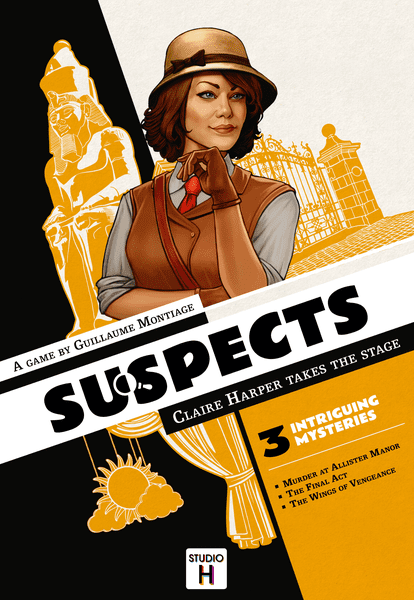Time for everyone to don their thinking caps. Suspects follows early 20th century adventurer Claire Harper in playable classic style mysteries.

Suspects is a card based mystery game that involves visiting locations, speaking to suspects, and examining items to try to unravel the secrets behind a crime. Claire Harper Takes the Stage includes three separate cases.
Each case has a couple extra things to go with the deck of cards to help direct and unravel the mystery. There’s usually some type of list of suspects as well as a a map to show the locations you can look at which gives a nice mental image of the crime scene. Anyone and anything that can be investigated has a number next to it, and you can take the card of any visible number (unless a restriction tells you otherwise).
I really like the system. It’s a great way to handle a somewhat free investigation with a deck of cards. The production quality is excellent and the oversized cards are great for this type of game. Specific mechanics range from evidence links where lines on the various cards will line up if related to certain cards only being available if a set number of identical symbols has already been revealed. The former is great, the latter not so much. The idea’s interesting but which cards would reveal the symbols seemed arbitrary at times and as such was more of a stumbling block than something to puzzle out.
The goals are stated up front in the form of questions the players are trying to answer. The rules explain that there is some meta information in the questions, (for example: if it asks who the murder, singular, is there will be no accomplice) but for me this was a plus not drawback. It prevented things from being too ambiguous to solve. Which is good, because these were quite challenging.
Some of the questions were open ended with room for interpretation on whether answers are right “enough,” but it didn’t detract much from the experience.
The main hurdle in this cases is the overabundance of information. For a game based on what can be fit into a deck of cards, the stories are fully formed and well fleshed out. Numerous suspects have compelling motives, and it’s easy to be led astray by what feels like the strongest. There’s a need to focus on small contradictions and/or method conjecture in order to catch on to what actually happened.
I adore mysteries and am fairly good at these types of games, but didn’t completely solve any of these. I don’t feel cheated at all though. The game is difficult and requires reading things extremely carefully, but the cases are solvable. I left each wanting to do better in the next one, determined to be a little more thorough. Some of the clues and deductions to be made are extremely subtle, but the information is all there to be found.
Which leads to an aspect where I made things more challenging unknowingly: I played all three of these cases solo. While I usually enjoy this type of game equally on my own or with a few friends, this is one of the rare examples where I think it’d play much better with 2 or 3 people. A second set of eyes on cards and someone thinking differently to bounce ideas off of is almost necessary to fully solve the cases. That said, personally I still really enjoyed trying to puzzle these out and will probably attempt the second set solo as well.
There’s a solid, interesting scoring system based on the number of cards seen before answering each question correctly (although there’s a bit of thematic disconnect with the descriptions of the end game tiers – they’re a little more negative in outcome at times than seems appropriate). There’s luck involved in what the player chooses to investigate first, but there are often little hints that point at the most important stuff.
Claire is a decent point of view character for these cases. She has just enough backstory to drive things, but at the same time is enough of a cipher to feel like the player is the one doing the investigating.
The instructions recommend playing the cases in order. While one character does repeat in a later case it wouldn’t spoil much to play these in any order you choose. There really isn’t increasing difficulty across the cases or anything like that. They’re different but roughly equivalent in challenge. But while it’s not really necessary here to play the cases in order, there’s no reason not to either.
As is expected with “solve a mystery” type games there’s no real replayability here, but three cases is a good amount and the game’s fully resettable and can be passed on to others.
Overall I had a great time with Suspects and am looking forward to the subsequent games.